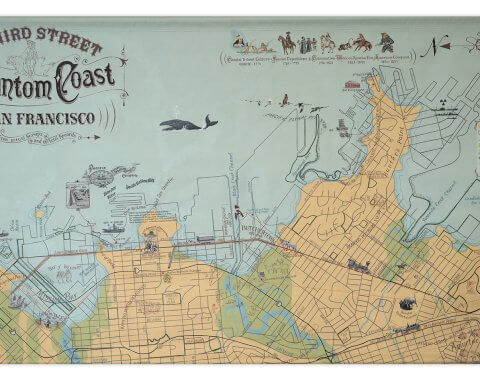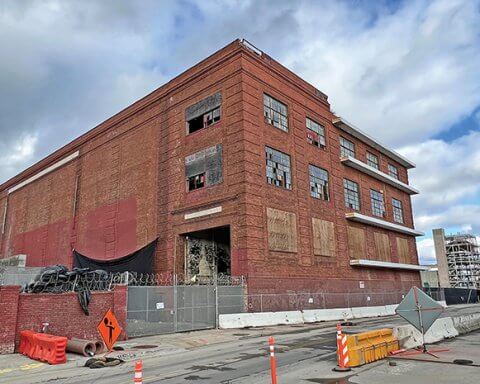With live entertainment dormant over the past year, theater companies have shifted to offering shows online, a tactic that hasn’t generated significant revenues. As operating losses grow, ongoing uncertainties brought by the pandemic make it difficult to plan for whatever seasons lie ahead.
PlayGround pivoted to the web at the start of the public health crises. When Potrero Stage, the venue it operates on 18th Street, went dark last March due to COVID-19 restrictions, the company was celebrating its 25th anniversary, featuring its annual New Works Festival. The production morphed into the PlayGround Zoom Fest which, with 50 offerings over six weeks, laid claim to being the country’s largest live-streamed offering of new works, with actors performing in separate locations.
“It ended up being an experiment in what worked and what didn’t,” Artistic Director Jim Kleinmann said. “We were one of the lucky ones. We figured out the tools and we were able to use a lot of what we learned during that time.”
The festival employed 140 actors and 100 playwrights, designers and directors, all of whom were paid, though it required a switch in unions from Actors’ Equity, which represents actors and stage mangers, to the Screen Actors Guild – American Federation of Television and Radio Artists, which deals with screen actors, television and radio artists.
The festival reached more than 8,000 households. “That would normally be a year’s worth of programming at the Potrero Stage,” said Kleinmann.
While the company has long focused on producing new works, Kleinmann is now committed to expanding its audience, including outside the San Francisco Bay Area.
PlayGround has since utilized Zoom for several other programs, including once-a-month readings of new plays and the just completed Fourth Annual Solo Performance Festival.
However, with an abundance of entertainment choices a few mouse clicks away, shows are generally offered based on voluntary contributions. Kleinmann indicated that PlayGround, which has leased the Potrero Stage since 2015, is heavily reliant on community donations.
When the closure order came one year ago, two other theater groups that sublease Potrero Stage, Crowded Fire and Golden Thread Productions, were a week and a half into a co-production of “On the Periphery.” The play had to close almost a month early.
“We were able to pay all the artists involved through the length of the run,” said Golden Thread Artistic Director Torange Yeghiazarian. “But so many of our artists went from some gigs to having zero employment overnight”.
While neither company has its own venue to maintain, both have small staffs and list up to 17 resident artists – directors, actors, sound and light designers – who would normally be working.
Yeghiazarian said Golden Thread will be able to maintain two fulltime and three parttime staff through the end of the year thanks to donations and the federal Paycheck Protection Program. This year is the company’s 25th Anniversary. She hopes to offer modified in-person shows by summer utilizing alternative spaces, such as parking lots where the audience remains in their cars.
Last summer, the Middle Eastern-focused company started livestreaming a conversation with an artist once a month. It also produced its first radio plays, “Leila’s Quest for Flight,” a children’s show about a Palestinian girl who dreams of becoming a pilot, and “The Language of Wild Berries” by Iranian playwright Naghmeh Samini, available via podcast.
Crowded Fire started a Twitch channel featuring online conversations about art and social justice. “There is a lot of talk about how this is a quiet reflective time for theaters,” said Managing Director Bethany Herron. “One of those reflections is to think about how to create more cultural equity and give voice to people who have been oppressed.”
Crowded Fire, which cites its main mission as new play development, has continued to work with playwrights. Its Matchbox series, involving readings of new plays, has moved online.
Brava For Women In the Arts also transitioned online, with three programs running monthly: “Who’s Your Mami Comedy” on Zoom, “So Soul Black Art Salon Series” on YouTube and “Indómitas,” a Spanish language podcast on Facebook. This month it’ll stream “Manifesto,” a one-person play that’d been staged in February, 2020. In April, for the second straight year its 9th Annual Son Jarocha Music Festival will be offered outdoors and online. In May it’ll premier its first radio play, “Palacios Sisters” by Cristina García.
Executive Director Anastacia Powers Cuellar said closing was devastating. “It took a lot of work. We had to lay off 20 people and re-organize the staff to keep,” she said. She expects the fallout from COVID-19 to cost the company $1.3 million by the end of this year; she doesn’t anticipate being able to open before then. She said Brava is existing off grants.
The company owns its 16,000-square foot building on 24th and York streets but has a mortgage. Brava has rented the theater to small film crews to do streaming and partnered with a University of California, San Francisco outreach program which needed space and administrative support for COVID testing studies. Mostly it’s been closed, though it did get a new mural painted on the outside.
“It’s costing quite a bit of money to keep the facility from falling apart,” Cuellar said. “It’s an old building with old issues. The roof still leaks when it rains.”
Still, Brava is assisting its resident artists with stipends. “So many of our artists were wiped out by the pandemic,” she said. “Trying to help other people survive, emotionally and to give them something bigger to connect with beyond their loneliness.”
For performance artists Christina Linksey and Aaron Simunovich, who run Little Boxes Theater on Tennessee Street, web skills and video editing weren’t part of their artistry. After spending the year learning they’ve been able to stream two prerecorded shows, an adjustment for a theater that once hosted Blind Cafe, a dinner show featuring “blind” waiters serving patrons while the theater lights were blacked out, and Brave Space, where aerialists dangled a foot above the audience, close enough for sweat to drip on them.
“Artists need an audience to feed off,” explained Linksey. “You want to persist in your craft and your trade but it’s not the same without seeing people’s faces. The adrenaline is not there.”
Linksey’s and Simunovich’s mostly focus on finding ways to pay rent. They renegotiated a one-year lease that comes up again in September but aren’t sure how long they can hold on.
Right after closing, the theater partnered with a startup nonprofit that needed space and extra hands to box food to distribute to the needy. “We went from Little Boxes to little boxes of food,” said Linksey. After two months the startup ran out of money.
To support performers the theater has stepped up fundraising for its longtime Project Open Box program, an artist in residency effort that’s always depended on donations. And it’s allowing players to safely rehearse at the space individually; many of them are circus artists whose apartments aren’t suitable.
“We’re not closed but we’re not open either. We’re open-ish. Five percent maybe,” said Linksey. “We’re just a couple weirdos trying to make it happen.”



